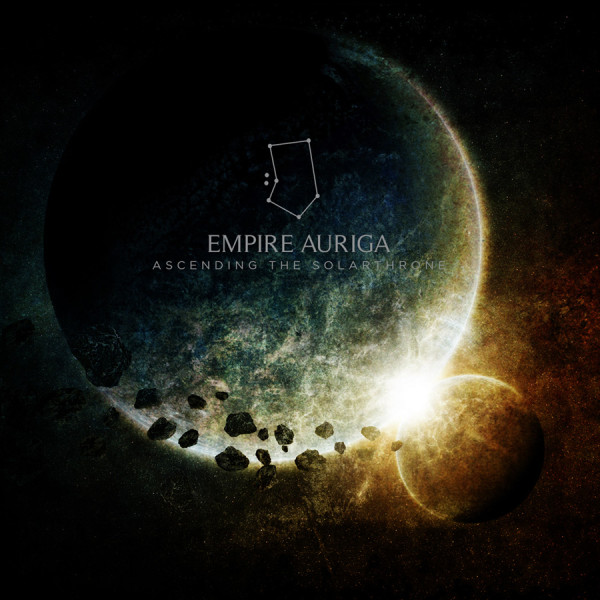American ambient-metal band Empire Auriga’s second album Ascending the Solar Throne expands the style pioneered by Burzum through the “Decrepitude” I& II tracks from “anti-black metal” album Filosofem. Ascending the Solar Throne comprises songs that are cold, distant, and simplistic. These spacious compositions rely on the repetition of arpeggiated guitars providing a base for reverb-drenched and piercing treble guitars to shine through, along with an anguished yet faint vocal accompaniment. Although the band forgoes the use of percussion entirely, tempi are regular and recursive song segments are identifiable. Synths or heavy guitar effects lightly sprinkle the mix almost as decoration, enhancing the presentation of the album but not interfering with its texture.
Expressing the desolation of technological existence, Empire Auriga weaves a journey through an inner experience of an individual separated from the external world of perception through pain, before coming to rest in a more peaceful place. Gradually moving from aggressive and dissonant chords in the beginning towards a calmer and safer mild major key conclusion, Ascending the Solar Throne is unfortunately unable to complete the journey which is hinted at in the opening tracks. Instead of turning the nihilism present into existential achievement, the album instead retreats into the safe and vacuous womb which afflicts most post-modern music.
Rather than confronting the question of one’s existence directly, as Filosofem did so elegantly, the choice instead is made to ignore it. This disappointment aside, Ascending the Solar Throne is an interesting album which attempts something rare in contemporary music: an artistic voyage. For that reason, it deserves consideration and acknowledgment where it succeeds, but ultimately the listener will be left slightly hollow and bereft.
Ascending the Solar Throne will be released on August 19th via Moribund Records.



This would’ve worked if they let go of the metal and stick to being ambient.
I don’t hear passion or depth, only the sound of weakness and confusion. Perhaps I’ve listened to metal for far too long, and now… diminishing returns. After invention comes innovation and then, imitation. Everything now, just a shadow of the past. What comes after death metal and black metal in music? It now rests entombed alongside baroque, folk, industrial and world music. Dead and broken, deep in the chasms of the abyss of mainstreamdom, where it is shat upon by the same people who guaranteed us our extinction not so long ago.
A byproduct of raped lives in raped cultures raping the identity away from what once was pure. This “post-black metal” is a symptom of a torn world, and we are all being given our just deserts for seeking something new from something old that has already given to us. We have all and will to continue to rape this world.
As much as I agree with this review, I still fail to see why this website keeps refering to Filosofem as an “anti-black metal” album; anyone care to elabore on this?
It was Varg Vikernes’ conscious attempt and the term he used to describe it.
It’s “anti-black” metal in that it was an attack on the first wave of pretenders: its production is the roughest he used since his demos and the song segments are elongated to a degree nobody had done, in that genre, before.
It was to be an attack on commercial, bite-size black metal.
It’s reactionary in that sense, but one could also view it as a return to original black metal philosophy, which was to create music so barbaric that nobody would want to listen to it. He simply developed its melody and added a contemplative focus.
Sort of reminds me of that Swiss black metal/ambient band Dark Space
– http://www.youtube.com/watch?v=CEWTEiRl6H8